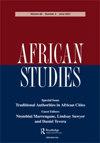Congo Wars
IF 1
4区 社会学
Q2 AREA STUDIES
引用次数: 0
Abstract
Following the global upsurge in conflict in the late 1980s and early 1990s, no confrontation turned out to be more devastating than the Great African War, which led to mass excess mortality with estimates ranging between 2.7 million and 5.4 million people dead in the 1998–2007 period. Unlike the First World War, with which it is often compared because of the multitude of states which battled each other on Congolese territory, Africa’s Great War cannot be defined by unambiguous start and end dates. The violence since the 1990s is perhaps more usefully thought of in analogy with Europe’s Thirty Years’ War in the 17th century or, as some historians argue, the cataclysmic conflict centered on Eurasia that encompassed both World Wars, separated only by a failing truce between 1919 and 1937. With not only alliances changing regularly in the Great African War but also a whole cast of participants joining and leaving the battlefield and the frontlines gradually blurring to the point of becoming virtually indefinable, many scholars prefer using “Congo Wars” to refer to a series of regularly interlinked but sometimes also clearly distinct conflicts—local, national, regional—waged on the territory of what was formerly known as Zaire and now as the Democratic Republic of the Congo (DRC). Thus, while a narrow definition separates out a “First Congo War” (beginning in September or October 1996 [once again, depending on one’s definition!] and ending on 17 May 1997) from the “Second Congo War” (the Great African War “proper,” from 2 August 1998 to 17 December 2002), other perspectives date the start of the conflict(s) back to the Rwandan genocide and argue that the Congo Wars, in parts of the territory like North and South Kivu and Ituri, are still ongoing. This bibliography takes a relatively expansive view of the conflagration, focusing publications analyzing the central events between 1996 and 2002, but acknowledging the impressive body of scholarship that not only scrutinizes the consequences of six years of catastrophic violence but also traces ongoing localized and/or transnational conflict in the DRC. At the time of writing (summer 2019), some optimism is taking hold after the peaceful (if controversial) handover of presidential power by Joseph Kabila to Felix Tshisekedi in January 2019 following elections in December 2018; violent confrontations among militias and between rebel groups, the MONUC/MONUSCO UN force, and the state still occur regularly, but not since 2013 have insurgents (i.e., the M23 rebellion) credibly threatened to take over an entire province, let alone seek to oust the president in Kinshasa: progress by Congolese standards. Although foreign actors still meddle in Congo’s politics, they do not do so as overtly and probably also not as profusely and effectively in the 2000s. The task will fall to historians a generation from now to assess whether the Congo Wars really have been coming to an end, twenty-five years after they began raging, or whether the current moment merely turned out to be a relatively peaceful interlude separating one set of violent outbursts from another.刚果战争
在20世纪80年代末和90年代初全球冲突激增之后,没有任何对抗比大非洲战争更具破坏性。大非洲战争导致大规模超额死亡率,估计1998-2007年期间有270万至540万人死亡。与第一次世界大战不同的是,非洲大战的开始和结束日期不能用明确的来定义。将20世纪90年代以来的暴力事件与17世纪的欧洲三十年战争相提并论,或者像一些历史学家所说的那样,将其与以欧亚大陆为中心的灾难性冲突相提并论,这场冲突包括了两次世界大战,只因1919年至1937年之间失败的休战而分开。随着联盟在大非洲战争中定期变化,而且一大批参与者加入和离开战场,前线逐渐模糊到几乎无法定义的地步,许多学者更喜欢用“刚果战争”来指代一系列经常相互关联但有时也明显不同的冲突——地方、国家、,区域性的——在以前的扎伊尔和现在的刚果民主共和国(DRC)领土上进行。因此,虽然狭义的定义将“第一次刚果战争”(始于1996年9月或10月[再次,取决于定义!],结束于1997年5月17日)与“第二次刚果战争(1998年8月2日至2002年12月17日的大非洲战争“本身”)区分开来,其他观点认为,冲突的开始可以追溯到卢旺达种族灭绝,并认为在北基伍、南基伍和伊图里等地区的刚果战争仍在继续。本参考书目对这场大火有着相对广泛的看法,重点是分析1996年至2002年间中心事件的出版物,但也承认了令人印象深刻的学术机构,它们不仅仔细研究了六年灾难性暴力的后果,还追溯了刚果民主共和国正在进行的局部和/或跨国冲突。在撰写本文时(2019年夏天),约瑟夫·卡比拉在2018年12月选举后于2019年1月和平(如果有争议的话)将总统权力移交给费利克斯·齐塞凯迪后,一些乐观情绪正在形成;民兵之间以及反叛组织、联刚特派团/联刚稳定团联合国部队和国家之间的暴力对抗仍然经常发生,但自2013年以来,叛乱分子(即M23叛乱)从未可信地威胁要占领整个省份,更不用说试图推翻金沙萨总统了:以刚果人的标准来看,这是一个进步。尽管外国行为者仍然干预刚果政治,但在21世纪初,他们并没有那么公开,也可能没有那么频繁和有效。这项任务将落在一代人之后的历史学家身上,他们将评估刚果战争在开始肆虐25年后是否真的已经结束,或者当前的时刻是否只是一个相对和平的插曲,将一系列暴力爆发与另一系列暴力发生分开。
本文章由计算机程序翻译,如有差异,请以英文原文为准。
求助全文
约1分钟内获得全文
求助全文

 求助内容:
求助内容: 应助结果提醒方式:
应助结果提醒方式:


